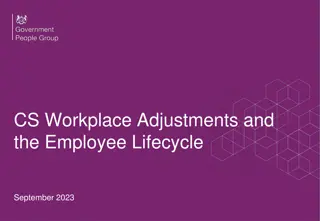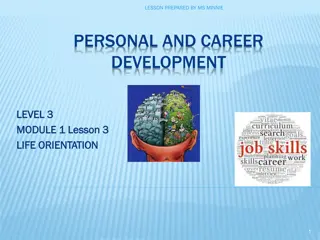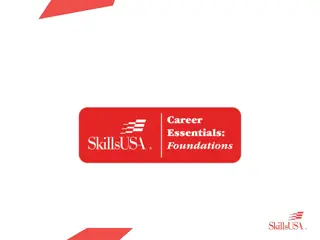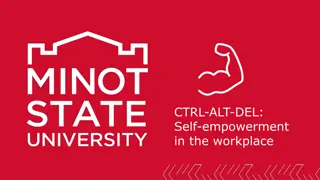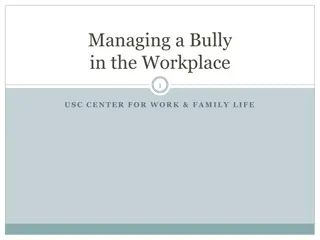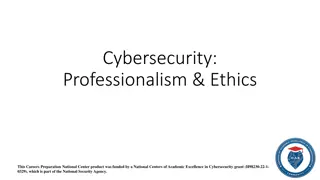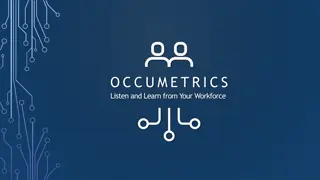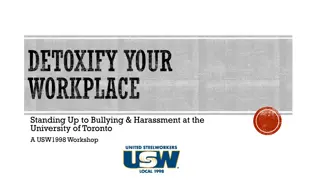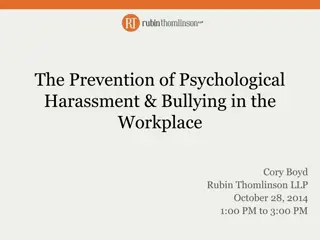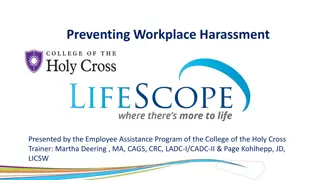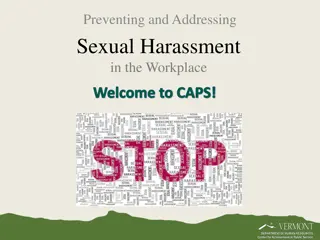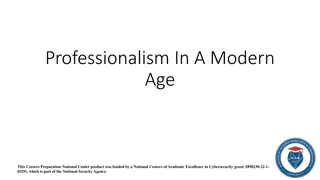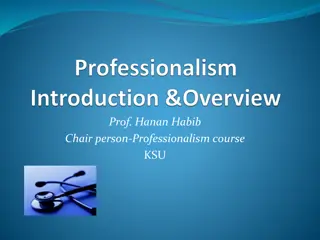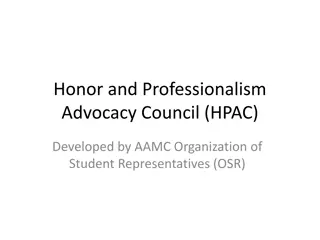Understanding Professionalism in the Workplace
Professionalism in the workplace involves conforming to specific rules governing appropriate behavior at work. This includes adherence to job-specific policies, environmental rules for creating a positive work environment, and personal conduct guidelines. Possessing qualities like interpersonal skills, work ethic, appearance, communication skills, and time management are key aspects of professionalism.
Download Presentation

Please find below an Image/Link to download the presentation.
The content on the website is provided AS IS for your information and personal use only. It may not be sold, licensed, or shared on other websites without obtaining consent from the author. Download presentation by click this link. If you encounter any issues during the download, it is possible that the publisher has removed the file from their server.
E N D
Presentation Transcript
UNIVERSITY OF IDAHO EXTENSION UNIVERSITY OF IDAHO EXTENSION PROFESSIONALISM IN THE CLICK TO EDIT SUB HEADLINE WORKPLACE SKILLS TO PAY THE BILLS BARBARA D. PETTY ASSOCIATE DEAN/DIRECTOR OF EXTENSION
WHAT IS PROFESSIONALISM? WHAT IS PROFESSIONALISM?
PROFESSIONALISM PROFESSIONALISM Conforming to a set of rules that dictate what is appropriate behavior at work, which includes rules that are: Job Job Specific Specific policies and procedures at a particular work place, such as following the right chain of command. Environmental Environmental rules that contribute to healthy, positive productive work environments, that often focus on attitudes and communication styles. Personal Personal rules that dictate personal behaviors such as dress, attendance, tardiness, etc.
York College Center for Professional Excellence PROFESSIONALISM IN PROFESSIONALISM IN THE WORKPLACE STUDY THE WORKPLACE STUDY Annual study starting in 2009. Online survey email invitation from President of York College. 2013 Workplace Report study included a nationwide random 401 human resource professionals. 2014 Career Development Report 2015 Recent College Graduates
An employee who is described as a professional possesses these QUALITIES QUALITIES Interpersonal skills Work Ethic Appearance Communication Skills Time management
1. INTERPERSONAL SKILLS 1. INTERPERSONAL SKILLS Listening and hearing that moves you to a response. The signals you send to others not what you say, but how you say it. I didn t say Joe was incompetent! Body language facial expressions, eye contact, posture, personal space. Stress management frustration management. Connecting to people small talk move the conversation along with asking for examples, clarity and understanding. See the other side and build a bridge.
2. WORK ETHIC 2. WORK ETHIC Integrity trusting relationships and high moral standards refrains from gossip/complaining honesty. Sense of responsibility put in right time and effort completes the task. Emphasis on quality do their best work to create great work, more than good enough your productivity improves the quality of the university and the community in which you live. Personal disciplines commitment to finish task - lifelong learner - continuing to develop skills and knowledge base - what you do when no one is looking. Sense of team work respect others- helps others meet their goals Pull your own weight.
3. APPEARANCE 3. APPEARANCE First impression
3. APPEARANCE 3. APPEARANCE
3. APPEARANCE 3. APPEARANCE
3. APPEARANCE 3. APPEARANCE Be clean and neat dress appropriately for the event change tie, scarf or jacket Cleavage is not to be seen in the workplace front or back Wear appropriate shoes Know your table manners/social graces Follow the host/hostess Work from the outside in
4. COMMUNICATION SKILL 4. COMMUNICATION SKILL Communicate clearly remember the power of the spoken word. Keep confidences. Use appropriate grammar. Don t bite the hand that signs your paycheck. Any fool can criticize, condemn and complain and most fools do. - Dale Carnegie
PHONE ETIQUETTE PHONE ETIQUETTE Smile through the phone Use greeting to identify office and your name Put your colleague in the best light Return phone calls Update your message
EMAIL EMAIL Be concise -- Use no more than four or five words in subject line. Avoid using large font and all capitals - shouting Don t send an email when emotional or angry. Email is not private be careful - what you put in print can be subject to public records request Check the thread you are forwarding Proofread, Proofread, Proofread! Respond within 24 hours if possible Words alone can be misinterpreted but limit emojis
ELECTRONIC MISTAKES ELECTRONIC MISTAKES Your cell phone becomes your top priority. Those around you can and will read your laptop screen. Ineffective voice mail greeting not keeping it current. Grammatical errors in email. Attaching working copy instead of final copy. Inappropriate posting on social media keep it generic.
5. TIME MANAGEMENT 5. TIME MANAGEMENT Be on time. Learn to work smarter not harder. Be honest to your employer with your time. Effective calendar management multiplies your time. I am already booked. Manage your energy.
UNPROFESSIONAL QUALITIES UNPROFESSIONAL QUALITIES Inappropriate appearance Poor work ethic Unfocused Apathetic Sense of entitlement Disrespectful and rude Lack of time management
LACK OF FOCUS LACK OF FOCUS Attendance Text messaging at inappropriate times Inappropriate use of internet Excessive cell phone usage for personal calls Excessive tweeting/Facebook
TEN SECRETS OF SUCCESS TEN SECRETS OF SUCCESS 1. 2. 3. 4. 5. Keep your temper to yourself. Give your enthusiasm to everyone. Make others feel important. Stamp out self-pity. Put your smile to work.
TEN SECRETS OF SUCCESS TEN SECRETS OF SUCCESS (CON T) (CON T) 6. Keep trying. 7. Give a good start to everything you do. 8. Forgive yourself .. if you fail. 9. Overwhelm people with charm, not power. 10.Keep promises.
U.S. Department of Labor PROFESSIONALISM PROFESSIONALISM Employers want workers to be responsible, ethical, team oriented, and to possess strong communication, interpersonal and problem solving skills. Wrap these skills up all together and you have professionalism. https://www.dol.gov/odep/topics/youth/softskills/





